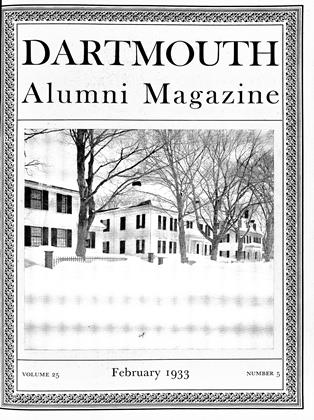MORE than ever before people are looking to the College for good taste. In an age in which crude ridicule, bombast, cheapness and vulgarity are widely disseminated from stages, radios, and talkie screens, the higher institutions of learning, without effort or statement, seem more and more apart from "commercialized art" as years go on. It was a noted orchestra leader who remarked a short time ago something to the effect that jazz had exhausted in seven years all the music of the previous thousand, and it seems as if modern plot makers, both in the realm of the novel and the dramatic, have been drawing very freely upon past material, confident in the assumption that the mass of American people were not familiar with sources. Old songs dressed up as new, old titles revamped as something novel, old backgrounds rehashed in rather vulgar form—these methods of turning other men's ideas and words and notes into quick cash have given certain quarters of America the reputation of being Tin Pan Alleys of the arts.
Exploitation, high-pressure selling, ballyhooing, —all these have spread the gospel of cheapness. And if the college ever had a purpose and a function it has them now. Rather creditably, without great affirmation or boast, the better institutions of higher learning stand apart naturally from the quest of the vulgar and the cheap. It is one of the satisfactions of teaching to realize that, after all, one has tried to live among the things which had permanency and originality, and these things of themselves are in themselves possessed of good taste. And when one thinks back to one's own teachers of college days one remembers most distinctly those men who lived in an atmosphere of culture. Although some of them may have lacked an element of practicality or the ability to coordinate the intellectual life with the practical, their gifts to their students and to the world were of high and even inestimable value. A civilization may possibly endure if it lacks good taste; it can however add nothing to the most essential welfare of mankind, since it fails to lift its people up to decent standards and fields of creative thought.
 View Full Issue
View Full Issue
More From This Issue
-
 Article
ArticleDeath
February 1933 -
 Article
ArticleHANOVER BROWSING
February 1933 By Rees Higgs Bowen -
 Article
ArticleA PRACTICING LAWYER
February 1933 By George M. Morris 'II -
 Class Notes
Class NotesClass of 1910
February 1933 By Harold P. Hinman -
 Class Notes
Class NotesClass of 1926
February 1933 By J. Branton Wallace, Ritchie C. Smith -
 Class Notes
Class NotesClass of 1929
February 1933 By Frederick William Andres, Mace Ingram, Bill Keyes
Article
-
 Article
ArticleU.S. Ambassador
JUNE 1967 -
 Article
ArticleClasses of 2005 and 2007
NOVEMBER 1996 -
 Article
ArticleBench Watcher
July/August 2008 By Bonnie Barber -
 Article
ArticleCarnival Movie
March 1939 By Davis Jackson '36. -
 Article
ArticleThe Faculty
May 1956 By HAROLD L. BOND '42 -
 Article
ArticleAbout 25 Years Ago
November 1936 By Warde Wilkins '13


